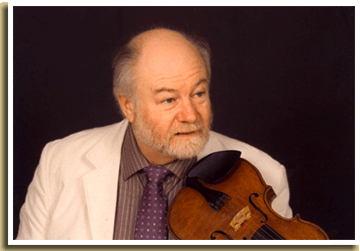
Antony Tarlton
Principal Violinist, Orchestra of Welsh National Opera
“He has transformed my violin . . . . I was so impressed with the preliminary work on my violin, and the detailed information Jonathan Beecher was able to give me as to why it hadn't worked previously, that I decided to have the radical rebuild of the instrument that he advised would make it a ‘great’ violin. Considering the magnificent tone and responsiveness which have now been achieved in this instrument, I am immensely thankful that I did not manage to sell the violin! . . . . . . Anyone who has the opportunity to work with Jonathan Beecher at this level is extremely fortunate.
Take your violin to him as soon as possible. I have known a sceptical player be totally convinced.”
-----------------------------------------------------------
READ COMPLETE TESTIMONIAL BELOW
I have been a professional violinist for some forty years, the last twenty five being as Assistant Leader and then Principal Second Violin with the Orchestra of Welsh National Opera and, not having had the financial resources to go out and buy a ‘great’ violin, life has been a constant search for the best that I could lay my hands on. Forgetting my student years, the violins that I have owned have been an 18th century English Edward Lewis, a 20th century English Karl Hepplewhite, a Beare certificated Vincenzo Panormo, which, arguably, I should have kept, a Hill certificated Ferdinand Gagliano, a 20th century English Christoph Gotting and my present instrument, which I bought prior to the Gotting and for which I sold the Gagliano. This violin, which is believed to be old Italian, produced the sort of sound that I was looking for. However, it had not been played for a very long time, but when played in, it became less and less manageable. After showing it to many distinguished luthiers, none of whom were able to improve it, I finally came to the conclusion that it had to go and spent five years desperately trying to sell it all over the world.
I had been introduced to Jonathan Beecher early in 2003 but never thought that we had any common interest other than violins in general. When overnighting in Oxford on my way to try and get some papers for this violin in London, I had the idea to contact Beecher Acoustics to see what they had to say. After two hours with Jonathan Beecher, the violin was unrecognisably improved from a sound point of view. It really worked!
Previously, when consulting other luthiers, telling them that the violin “didn't work”, they asked me for an explanation. Mr. Beecher, being a very considerable ’cellist and with a professionally trained musician’s ear, however, did not have to ask what I meant, he knew straight away. His approach to tonal adjustment is based upon his listening ability and his knowledge gained from his study of the acoustics of string instruments. He has transformed my violin, which one very good player had previously recommended I ‘dump’, and which a most respected violin maker and restorer, who has probably worked on more Strads than anyone else in Britain, had said, because of its very flat and broad design it could never work and become a ‘great’ violin.
Every other luthier that I have come upon has been simply that, a luthier; a master craftsman, who has learned his craft of using tools, studying the methods of the great makers. They work on the thesis that if you make your instrument to the correct design then it will work. Sadly, we players realise that this is not always the case. My violin was made in the late 1690’s during a period of experimentation, and the challenges which its particular design threw up had never been sorted out. The usual luthier procedures produced no result. Jonathan Beecher’s unusual approach, based, as it is, upon the mechanics of sound, rather than the mechanics of accepted instrument making, is a legitimate way forward and not one to be dismissed.
I was so impressed with the preliminary work on my violin, and the detailed information Jonathan Beecher was able to give me as to why it “hadn’t worked” previously, that I decided to have the radical rebuild of the instrument that he advised would make it a ‘great’ violin. Considering the magnificent tone and responsiveness which have now been achieved in this instrument, I am immensely thankful that I did not manage to sell the violin!
Jonathan Beecher has spent a considerable part of his life devoted to ‘optimising’ instruments. The instrument has to be built within certain measurable criteria and then, having been made into a ‘sound’ body, i.e. all the joints and edges well fitted to each other. Then the tonal adjustments can be made. He does this by listening to ‘the’ player playing a simple scale through the whole range of the instrument. I say ‘the’ player, as he, Mr. Beecher, is able to tonally adapt the fiddle to each player’s style of playing. This is not a ‘quick fix’ procedure and requires him getting to know the individual characteristics of each of his clients. This he does with an understanding and generosity of spirit, which is simply as remarkable as the results that he produces.
I have also had the opportunity to play several modestly priced violins restored by Beecher Acoustics, and have used one of these instruments professionally for several months, and found it extremely responsive, and ideal for my work with WNO and leading a quartet.
Anyone who has the opportunity to work with Jonathan Beecher at this level is extremely fortunate. Take your violin to him as soon as possible. I have known a sceptical player be totally convinced. His workshop produces the most amazing bows as well!